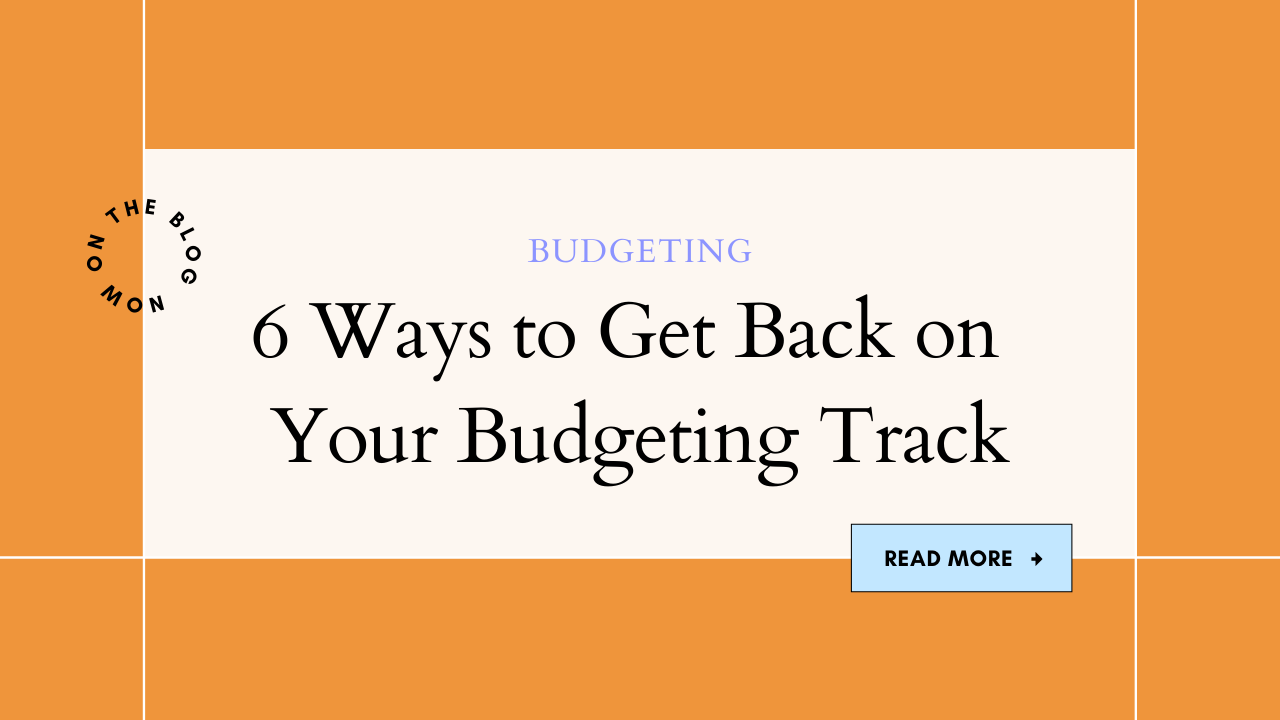6 Ways to Get Back on Track with your Monthly Budget

So you’ve completely blown your budget out of the water…don’t worry, it happens to the best of us. I promise. Yes, even personal finance enthusiasts such as myself!
Listen, life happens. That’s why I like to remind you that you might not get your budgeting method down on the first try, and that’s okay. There are a lot of budgeting strategies out there and depending on where you are in your financial journey, there may be one that works more than the other. You may also have a combination of strategies that work for you. That’s perfectly okay, too! However, if you find that your current method isn’t working for you, here are some tips to help you get back on track:
-
Evaluate your spending: There is a lot of information out there about what factors have an impact on our spending habits. When I start to notice I’m spending more than usual, I first look at what else is going on in my life. Am I preparing for a trip? Am I stressed or overwhelmed about something? Have I been spending too much time on IG and being inundated with ads? Figure out what exactly is triggering your spending. Remember that money IS emotional and it’s all about mindset. Sometimes you just need to start there.
-
Check your expenses: It’s important to keep an eye on your expenses, especially those pesky recurring ones. There have been times where I went over budget simply because I forgot to check my subscriptions and got hit with multiple yearly renewals at the same time. Oof - don’t ya just hate when that happens? Review your subscriptions and memberships to be sure these are things you are actually using and not unnecessary expenses eating away at your budget.
-
Adjust your categories: My categories do not stay the same from month to month and that’s okay. At the beginning of the month, think about rearranging your budget to give you more money in some categories and less in other categories. For example, maybe last month you went overboard shopping because you were preparing for a trip, but this month you won’t be shopping as much so you can increase your self care category. Speaking off, I like to be very specific in my categories so instead of just saying “fun” break up exactly what that means: shopping, self care, dining out, night out with friends, etc.
-
Use automation: I absolutely love the power of automation because it takes the guesswork out of budgeting! If you set everything up on autopay you won’t have to think about making too many adjustments and you may find it easier to stay on track. With that being said, be sure that you still know what will be coming out automatically and set up a category for it. Once you know what will be automated, you simply need to divide the remaining money into your other categories.
-
Switch budgeting methods: There are TONS of budgeting methods including: 50/30/20, cash based, value based, pay yourself first, etc. There are a lot of budgeting strategies out there and depending on where you are in your financial journey, there may be one that works more than the other. You may also have a combination of strategies that work for you. That’s perfectly okay, too! For example, when I first started out I liked having a strategy that didn’t allow any room for error so I liked the 50/30/20 but then it started to feel entirely too restrictive. Now, my budgeting strategy is a mix of zero based and value based.
-
Implement a “no buy” week: There are a few ways to do this - you can do it proactively or reactively. Proactively, you decide what week in the month you absolutely will not spend any money and every month that’s your no buy week. Or, you can do it reactively if you start to see you might be overspending, decide that the following week you will have a no buy week - as in nothing at all (except maybe gas because I don’t want you to get stranded).
My budget categories change from month to month because my priorities change from month to month. If I overspend one month, instead of telling myself “okay, I just need to eat out less next month” I will say “well, where can I cut back on spending so that I can afford to eat out as much as I want?” Maybe I’ll cancel a subscription I’m not really using, or I’ll leave amazon alone for the month.
There has to be some room for negotiation with yourself - especially if you are like me and in student loan debt. I like to treat myself (after the basic expenses are paid) but sometimes I’ve gotta choose between getting my facial vs. going to a nice restaurant for dinner one weekend. It’s all about sacrifice but leaving room to indulge in the things that are going to make you happy.
Lastly, remember that your budget should be tailored to fit your lifestyle, not the other way around. When your budget is based on what’s important to you, what you value, your personality and preferences, you’re more likely to have success sticking to it…and staying on track.
Do you have a favorite budgeting strategy? What has helped you stick to your budget?
P.S. The “How to Prioritize Saving, Investing, and Paying Off Debt” webinar registration will close in THREE days. We are halfway sold out so this is your opportunity to get in before the doors close. If you’re trying to learn how to create a budget that actually works for you, this is your chance. Click HERE to learn more & grab your spot!
